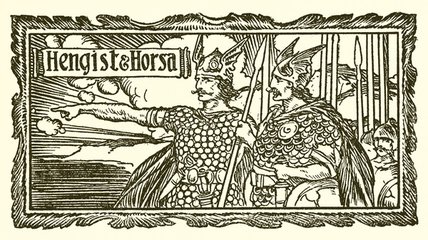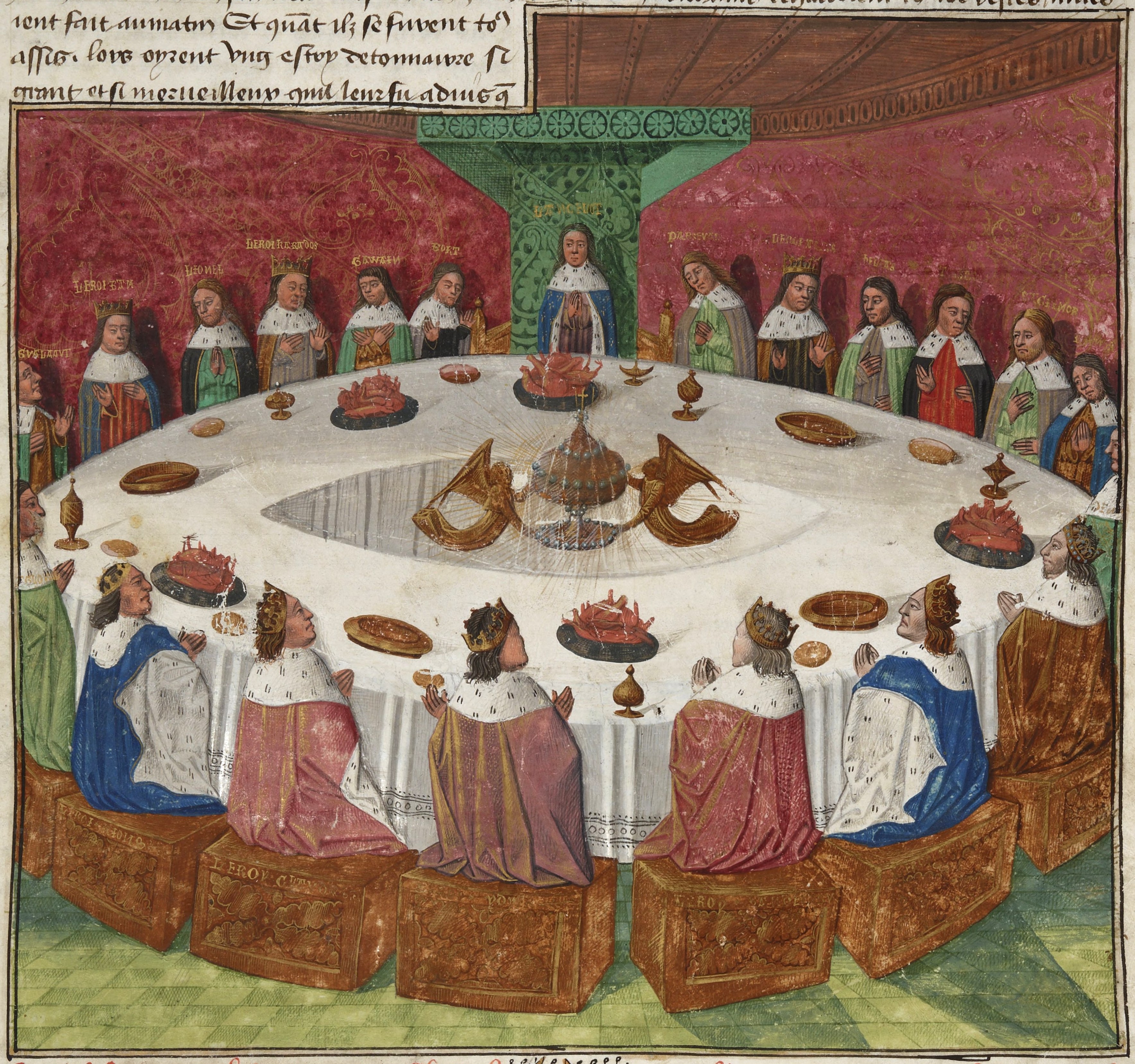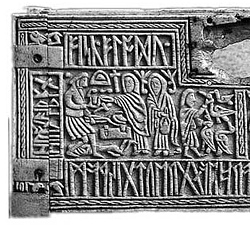|
Wecta
Wecta ( Old English: ''Wægdæg'', Old Norse: ''Vegdagr'') is mentioned in the ''Anglo-Saxon Chronicle'' and the ''Historia Brittonum''. Wecta is considered mythological, though he shows up in the genealogies as a Saxon ancestor of Hengest and Horsa and the kings of Kent, as well as of Aella of Deira and his son Edwin of Northumbria. Wecta appears in the '' Prologue to the Prose Edda'' as Vegdeg, one of Woden's sons, a mighty king who ruled East Saxony. Although Wecta is mentioned as the father of Witta and the grandfather of Wihtgils in the ''Anglo-Saxon Chronicle'' and the ''Historia Brittonum'', the ''Prose Edda'' and the Anglian collection of Anglo-Saxon genealogies reverses the order of Witta and Wihtgils in the genealogy. See also *Anglo-Saxon mythology *Germanic mythology *Godwulf *Norse mythology *English mythology English mythology is the collection of myths that have emerged throughout the history of England, sometimes being elaborated upon by successive generations ... [...More Info...] [...Related Items...] OR: [Wikipedia] [Google] [Baidu] |
Godwulf Of Asgard
A number of royal genealogies of the Anglo-Saxon kingdoms, collectively referred to as the Anglo-Saxon royal genealogies, have been preserved in a manuscript tradition based in the 8th to 10th centuries. The genealogies trace the succession of the early Anglo-Saxon kings, back to the semi-legendary kings of the Anglo-Saxon settlement of Britain, notably named as Hengest and Horsa in Bede's ''Historia ecclesiastica gentis Anglorum'', and further to legendary kings and heroes of the pre-migration period, usually including an eponymous ancestor of the respective lineage and converging on Woden. In their fully elaborated forms as preserved in the ''Anglo-Saxon Chronicles'' and the '' Textus Roffensis'', they continue the pedigrees back to the biblical patriarchs Noah and Adam. They also served as the basis for pedigrees that would be developed in 13th century Iceland for the Scandinavian royalty. Documentary tradition The Anglo-Saxons, uniquely among the early Germanic peoples, ... [...More Info...] [...Related Items...] OR: [Wikipedia] [Google] [Baidu] |
Hengest And Horsa
Hengist and Horsa are Germanic brothers said to have led the Angles, Saxons and Jutes in their invasion of Britain in the 5th century. Tradition lists Hengist as the first of the Jutish kings of Kent. Most modern scholarly consensus now regards Hengist and Horsa to be mythical figures, and much scholarship has emphasised the likelihood of this based on their alliterative animal names, the seemingly constructed nature of their genealogy, and the unknowable quality of the earliest sources of information for their reports in the works of Bede.Halsall (2013:60-62). Their later detailed representation in texts such as the Anglo-Saxon Chronicle can tell us more about ninth-century attitudes to the past than anything about the time in which they are said to have existed.Yorke (1993).Harland (2021:32). According to early sources, Hengist and Horsa arrived in Britain at Ebbsfleet on the Isle of Thanet. For a time, they served as mercenaries for Vortigern, King of the Britons, but lat ... [...More Info...] [...Related Items...] OR: [Wikipedia] [Google] [Baidu] |
Anglo-Saxon Gods
Anglo-Saxon deities are in general poorly attested, and much is inferred about the religion of the Anglo-Saxons from other Germanic peoples. The written record from the period between the Anglo-Saxon invasion of the British Isles to the Christianisation of the Anglo-Saxons is very sparse, and most of what is known comes from later Christian writers such as Bede, whose descriptions can be compared to other Germanic mythologies as well as the extant archaeological evidence. The list below is incomplete but includes brief discussion of the attestation of the deities in question, and should be considered critically. Major deities * Woden, king of the gods and god of wisdom. Cognate to Norse Odin. Source of the word 'Wednesday'. * Tiw, a war god and possibly a sky god. Cognate to Norse Tyr, as well as Greek Zeus, Roman Jupiter, Baltic Dievs/Dievas and Hindu Dyaus. Source of the word 'Tuesday'. * Thunor, god of thunder and cognate to Norse Thor and source of the word 'Thursday'. * F ... [...More Info...] [...Related Items...] OR: [Wikipedia] [Google] [Baidu] |
Old English Language
Old English (, ), or Anglo-Saxon, is the earliest recorded form of the English language, spoken in England and southern and eastern Scotland in the early Middle Ages. It was brought to Great Britain by Anglo-Saxon settlers in the mid-5th century, and the first Old English literary works date from the mid-7th century. After the Norman conquest of 1066, English was replaced, for a time, by Anglo-Norman (a relative of French) as the language of the upper classes. This is regarded as marking the end of the Old English era, since during this period the English language was heavily influenced by Anglo-Norman, developing into a phase known now as Middle English in England and Early Scots in Scotland. Old English developed from a set of Anglo-Frisian or Ingvaeonic dialects originally spoken by Germanic tribes traditionally known as the Angles, Saxons and Jutes. As the Germanic settlers became dominant in England, their language replaced the languages of Roman Britain: ... [...More Info...] [...Related Items...] OR: [Wikipedia] [Google] [Baidu] |
Saxony
Saxony (german: Sachsen ; Upper Saxon: ''Saggsn''; hsb, Sakska), officially the Free State of Saxony (german: Freistaat Sachsen, links=no ; Upper Saxon: ''Freischdaad Saggsn''; hsb, Swobodny stat Sakska, links=no), is a landlocked state of Germany, bordering the states of Brandenburg, Saxony-Anhalt, Thuringia, Bavaria, as well as the countries of Poland and the Czech Republic. Its capital is Dresden, and its largest city is Leipzig. Saxony is the tenth largest of Germany's sixteen states, with an area of , and the sixth most populous, with more than 4 million inhabitants. The term Saxony has been in use for more than a millennium. It was used for the medieval Duchy of Saxony, the Electorate of Saxony of the Holy Roman Empire, the Kingdom of Saxony, and twice for a republic. The first Free State of Saxony was established in 1918 as a constituent state of the Weimar Republic. After World War II, it was under Soviet occupation before it became part of the communist East ... [...More Info...] [...Related Items...] OR: [Wikipedia] [Google] [Baidu] |
English Mythology
English mythology is the collection of myths that have emerged throughout the history of England, sometimes being elaborated upon by successive generations, and at other times being rejected and replaced by other explanatory narratives. These narratives consist of folk traditions developed in England after the Norman Conquest, integrated with traditions from Anglo-Saxon mythology, Christian mythology, and Celtic mythology. Elements of the Matter of Britain, Welsh mythology and Cornish mythology which relate directly to England are included, such as the foundation myth of Brutus of Troy and the Arthurian legends, but these are combined with narratives from the Matter of England and traditions from English folklore. Notable figures and legends * Alfred the Great (849–899): In 878, burns the cakes in Athelney, Somerset before defeating the Great Heathen Army at the Battle of Edington. * Angul (13th century): Legendary founder and king of the Angles. * King Arthur (late 5th a ... [...More Info...] [...Related Items...] OR: [Wikipedia] [Google] [Baidu] |
Norse Mythology
Norse, Nordic, or Scandinavian mythology is the body of myths belonging to the North Germanic peoples, stemming from Old Norse religion and continuing after the Christianization of Scandinavia, and into the Nordic folklore of the modern period. The northernmost extension of Germanic mythology and stemming from Proto-Germanic folklore, Norse mythology consists of tales of various deities, beings, and heroes derived from numerous sources from both before and after the pagan period, including medieval manuscripts, archaeological representations, and folk tradition. The source texts mention numerous gods such as the thunder-god Thor, the raven-flanked god Odin, the goddess Freyja, and numerous other deities. Most of the surviving mythology centers on the plights of the gods and their interaction with several other beings, such as humanity and the jötnar, beings who may be friends, lovers, foes, or family members of the gods. The cosmos in Norse mythology consists of Nine ... [...More Info...] [...Related Items...] OR: [Wikipedia] [Google] [Baidu] |
Germanic Mythology
Germanic mythology consists of the body of myths native to the Germanic peoples, including Norse mythology, Anglo-Saxon mythology, and Continental Germanic mythology. It was a key element of Germanic paganism. Origins As the Germanic languages developed from Proto-Indo-European language, Germanic mythology is ultimately a development of Proto-Indo-European mythology. Archaeological remains, such as petroglyphs in Scandinavia, suggest continuity in Germanic mythology since at least the Nordic Bronze Age. Sources The earliest written sources on Germanic mythology include literature by Roman writers. This includes '' Commentaries on the Gallic War'' by Julius Caesar, '' Geographica'' by Strabo, and ''Germania'' by Tacitus. Later Latin-language sources on Germanic mythology include ''Getica'' by Jordanes, '' History of the Lombards'' by Paul the Deacon, ''Ecclesiastical History of the English People'' by Bede, '' Vita Ansgari'' by Rimbert, '' Gesta Hammaburgensis eccle ... [...More Info...] [...Related Items...] OR: [Wikipedia] [Google] [Baidu] |
Anglo-Saxon Mythology
Anglo-Saxon paganism, sometimes termed Anglo-Saxon heathenism, Anglo-Saxon pre-Christian religion, or Anglo-Saxon traditional religion, refers to the religious beliefs and practices followed by the Anglo-Saxons between the 5th and 8th centuries AD, during the initial period of Early Medieval England. A variant of Germanic paganism found across much of north-western Europe, it encompassed a heterogeneous variety of beliefs and cultic practices, with much regional variation. Developing from the earlier Iron Age religion of continental northern Europe, it was introduced to Britain following the Anglo-Saxon migration in the mid 5th century, and remained the dominant belief system in England until the Christianisation of its kingdoms between the 7th and 8th centuries, with some aspects gradually blending into folklore. The pejorative terms ''paganism'' and ''heathenism'' were first applied to this religion by Christian Anglo-Saxons, and it does not appear that these pagans had a na ... [...More Info...] [...Related Items...] OR: [Wikipedia] [Google] [Baidu] |
Anglian Collection
''The Anglian collection'' is a collection of Anglo-Saxon royal genealogies and regnal lists. These survive in four manuscripts; two of which now reside in the British Library. The remaining two belong to the libraries of Corpus Christi College, Cambridge and Rochester Cathedral, the latter now deposited with the Medway Archives. Compilation All manuscripts appear to derive from a common source, now lost. Based on content and the pattern of divergence, Dumville dates its composition to 796 in Mercia. Both the genealogies and the episcopal lists were part of this original compilation, and have passed in tandem, with the surviving manuscripts all several steps removed from this original. All the manuscripts include genealogies for the kingdoms of Deira, Bernicia, Mercia, Lindsey, Kent and East Anglia. Three of them (C, T and R) also contain a West Saxon genealogy, and regnal lists for Northumbria and Mercia. This may represent material omitted or lost from the fourth (V) ra ... [...More Info...] [...Related Items...] OR: [Wikipedia] [Google] [Baidu] |
Prologue To The Prose Edda
The Prologue is the first section of four books of the ''Prose Edda'', and consists of a euhemerized account of the origins of Norse mythology: the Norse gods are described descended from the Thracians. Regarding the euhemerization in the ''Prologue'', Faulkes (1985) commented that "undoubtedly one of the motives for including the prologue, and maybe the chief reason for the use of the frame device itself, was to avoid the criticism that his stories were dangerous to hristianorthodoxy".Faulkes (1985:284-285). The section's genealogy presented begins with Priam. Priam's daughter Tróán married king Múnón or Memnon or Menon. Their son was Trór, or Thor, who was fostered in Thrace. Thor slew his foster father and married Sibil, identified with Sif. The line of descendants of Thor and Sif is given as follows: : Lóriði, Einridi, Vingethor, Vingener, Móda, Magi, Seskef, Bedvig, Athra, Ítermann, Heremód, Skjaldun, Bjáf , Ját, Gudólfr, Finn, Fríallaf ... [...More Info...] [...Related Items...] OR: [Wikipedia] [Google] [Baidu] |
Woden
Odin (; from non, Óðinn, ) is a widely revered god in Germanic paganism. Norse mythology, the source of most surviving information about him, associates him with wisdom, healing, death, royalty, the gallows, knowledge, war, battle, victory, sorcery, poetry, frenzy, and the runic alphabet, and depicts him as the husband of the goddess Frigg. In wider Germanic mythology and paganism, the god was also known in Old English as ', in Old Saxon as , in Old Dutch as ''Wuodan'', in Old Frisian as ''Wêda'', and in Old High German as , all ultimately stemming from the Proto-Germanic theonym *''Wōðanaz'', meaning 'lord of frenzy', or 'leader of the possessed'. Odin appears as a prominent god throughout the recorded history of Northern Europe, from the Roman occupation of regions of Germania (from BCE) through movement of peoples during the Migration Period (4th to 6th centuries CE) and the Viking Age (8th to 11th centuries CE). In the modern period, the rural folklore of Germanic Eu ... [...More Info...] [...Related Items...] OR: [Wikipedia] [Google] [Baidu] |
.png)







.png)
